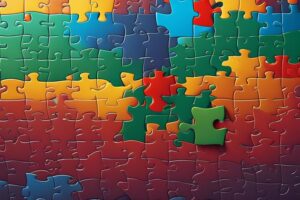I. ASD & Your Child’s Immune System
Recent research suggests a connection between the immune system and Autism Spectrum Disorder (ASD). We’ve learned that children with ASD might experience inflammation in the brain and imbalances in the immune system, which can impact their development and behaviors.
In simpler terms, this is like when you get a fever because your body is fighting an infection. Only in this case, the inflammation is happening in the brain and may be affecting the way your child’s brain grows and develops.
Furthermore, some genes, the basic building blocks that make us who we are, are involved in both how our immune systems work and how our brains develop. Changes in these genes may be linked to ASD. Although it’s complex and there’s still a lot we don’t know, researchers are working hard to understand these connections more deeply.
II. Epigenetics and ASD
Now let’s talk about epigenetics, which is the study of changes in organisms caused by modification of gene expression rather than alteration of the genetic code itself.
In plain language, it means that outside influences, like the environment, can change how our genes work, and these changes might play a role in ASD. Scientists have found that factors like stress or exposure to toxins can cause these changes, influencing how the brain develops and how genes involved in things like social interaction, language development, and sensory processing function.
Researchers are actively studying this area to learn more about how it might contribute to ASD and how we might be able to use this knowledge to help kids with ASD.
III. Gene Expression and ASD
When we talk about gene expression, we’re talking about how and when specific genes get turned on or off. Like flipping switches on a control panel, certain things can influence which genes are active at any given time. In ASD, epigenetic changes, genetic variations, and environmental factors can all affect this control panel, potentially contributing to the disorder.
Scientists are digging deeper into how these switches work and how we can use that knowledge to help kids with ASD.
IV. Early Signs and Early Diagnosis
Understanding early signs of ASD can help your child get the support they need as soon as possible. These can include difficulties with social communication, repetitive behaviors, sensory sensitivities, challenges with social interaction, rigidity in routines, or delays in development.
Remember, every child is unique, so these signs can vary. If you’re worried about your child’s development, talk to a healthcare professional who can provide guidance and, if necessary, a comprehensive evaluation.
Healthcare professionals diagnose ASD using established criteria and assessment tools, like the Autism Diagnostic Observation Schedule (ADOS), Childhood Autism Rating Scale (CARS), and the Social Communication Questionnaire (SCQ). These tools help gather a complete picture of your child’s development and behaviors, guiding the way to the best support and interventions.
Remember, early intervention can make a significant difference for kids with ASD, and every step you take towards understanding and supporting your child’s unique needs is a step forward.
V. Resources
If you want to learn more about autism spectrum disorder, here are a few websites you can visit:
Please note: This guide is intended to provide a simple explanation of complex scientific concepts. If you’re looking for more in-depth information, please refer to the scientific sources cited or consult with a healthcare professional or specialist.







